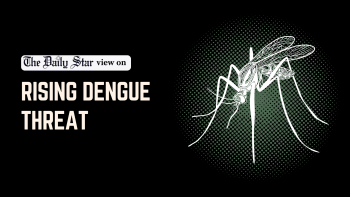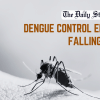Dengue management efforts still inadequate

We are disappointed by the slow response of the government authorities to the rising threat of dengue across the country. According to the Directorate General of Health Services (DGHS), 27,705 dengue patients have been hospitalised this year as of the morning of September 27, with 143 of them having died during the same period. The fact that more than half of these cases were reported in September alone should set alarm bells ringing. The question is, why didn't the authorities take the necessary steps in time despite repeated warnings from experts that dengue could become fatal this year? While it is understandable that the void created in our local government institutions after the fall of the Awami League government has hampered our dengue control programmes for some time, there should be no excuse for any failure now, as administrators were eventually appointed in the city corporations and municipalities after the interim government took charge.
Reportedly, the current weather conditions in the country—intermittent rains and high humidity—are very suitable for the breeding of Aedes mosquitoes. According to entomologists, if this weather pattern persists, the number of dengue cases will peak in October. A field-level survey has already found a high density of Aedes mosquitoes in the capital. The dengue situation is also rapidly worsening in Chattogram. This means there is no scope for the authorities to take the matter lightly anymore. The death of 60 people (as of the morning of September 27) in less than one month should serve as a wake-up call for our city and municipal authorities.
They should immediately conduct mosquito eradication drives across the country, including in the hospitals, giving more importance to hotspot management. It must also be ensured that effective insecticides are used in these drives. Keeping the cities clean and conducting awareness campaigns to engage people in these initiatives is also crucial. In addition, the DGHS has a very important role to play here. It should prepare hospitals and healthcare facilities to provide proper care to dengue patients, maintain an accurate database of patients, and conduct regular surveys to tackle this deadly threat. It is, however, encouraging that the government has formed some teams to ensure the implementation, coordination, and supervision of mosquito eradication efforts across the country. We hope they will be able to tackle the situation before it is too late.


 For all latest news, follow The Daily Star's Google News channel.
For all latest news, follow The Daily Star's Google News channel. 









Comments